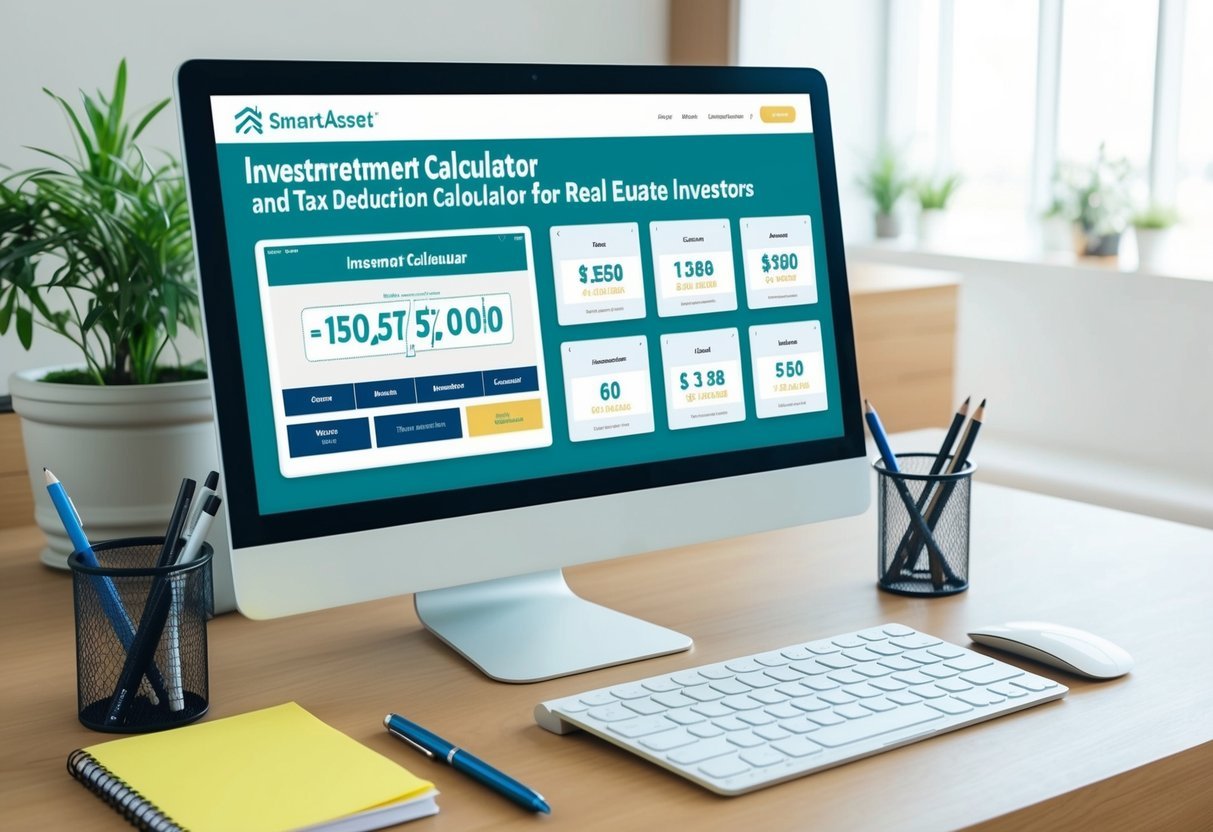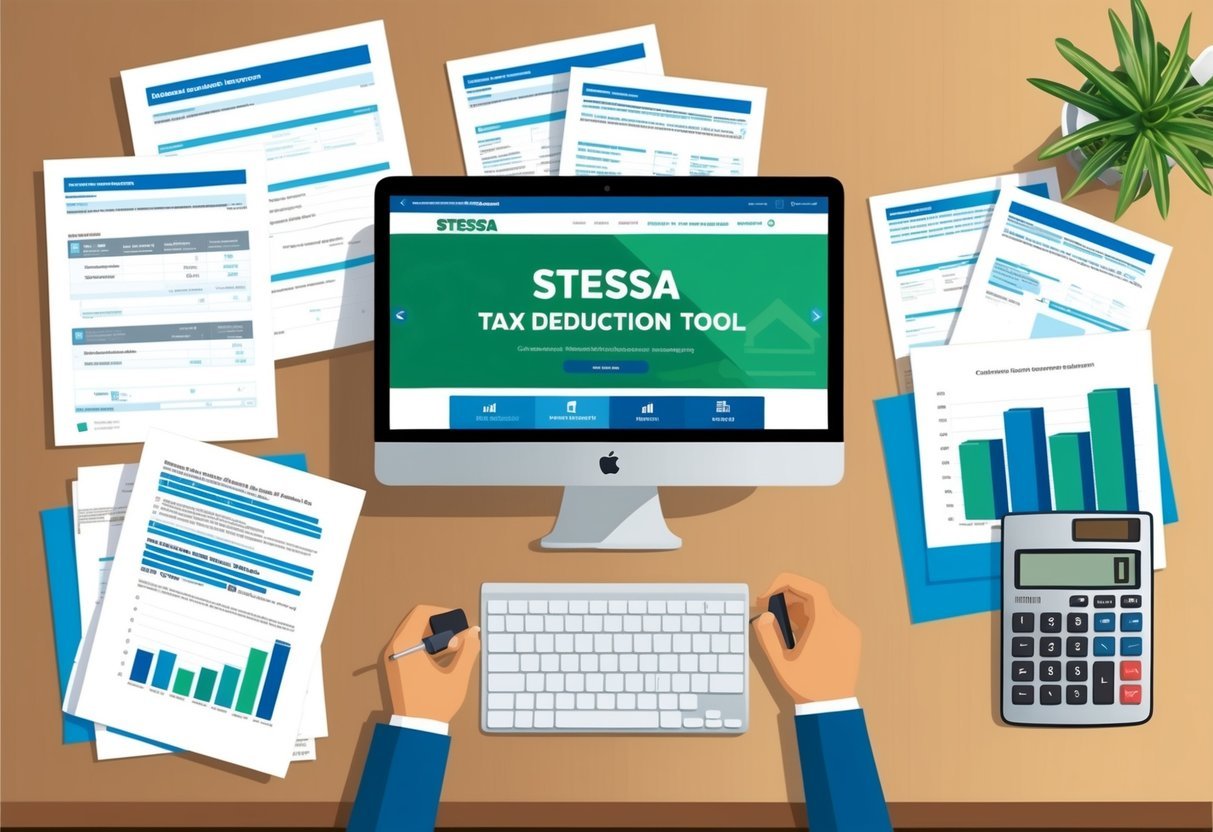Real estate investing can be a lucrative venture, but navigating the complex world of tax deductions can be challenging.
As an investor, you have numerous opportunities to reduce your tax liability and maximize your profits.
Understanding these deductions is crucial for optimizing your investment strategy and ensuring compliance with tax regulations.

Tax deduction calculators can be invaluable tools for real estate investors, helping you accurately estimate potential savings and make informed financial decisions. These calculators simplify the process of determining which expenses are deductible and how they impact your overall tax situation.
By utilizing these resources, you can streamline your tax planning efforts and potentially uncover additional deductions you may have overlooked.
1) TurboTax Real Estate
TurboTax offers valuable tools for real estate investors looking to maximize their tax deductions.
You can use their real estate tax calculator to estimate potential savings on your rental properties.
When filing your taxes, TurboTax guides you through the process of deducting property taxes on your rental properties.
This deduction can significantly reduce your taxable income.
If you’re married and file separately, TurboTax helps you navigate special rules.
You may qualify for a maximum rental real estate loss exception of $12,500, with phase-outs starting at a modified Adjusted Gross Income of $50,000.
For those renting out part of their own home, TurboTax calculates a prorated deduction.
This ensures you claim the correct amount for both personal and rental use of your property.
TurboTax also assists with Form 8582, which is crucial for calculating passive activity losses in real estate investments.
This form helps you determine the amount of allowable losses you can claim.
You can designate yourself as a real estate professional within TurboTax.
This status may allow you to deduct passive losses from rental property that might otherwise be limited.
2) H&R Block Tax Prep
H&R Block offers valuable tax preparation services for real estate investors.
Their tax calculator can help you estimate your potential refund or tax liability.
As a real estate investor, you can benefit from H&R Block’s expertise in handling complex tax situations.
Their services are designed to address various deductions and credits specific to property investments.
You can choose from different filing options with H&R Block.
These include online self-preparation, software downloads, and in-person assistance at local offices.
Each option caters to different levels of complexity in your real estate tax situation.
H&R Block’s tax professionals are well-versed in rental income taxes.
They can guide you through reporting rental income, claiming deductions, and understanding passive activity rules.
When dealing with passive activity losses from your real estate investments, H&R Block can assist you with IRS Form 8582.
This form is crucial for calculating allowable losses from rental properties.
You can access expert help at various price points with H&R Block.
Their services start at $55 for federal returns, with an additional $49 for each state filed.
This pricing structure allows you to choose a service level that fits your needs and budget.
Remember to gather all necessary documents related to your real estate investments before starting your tax preparation.
This includes income statements, expense receipts, and property-related financial records.
3) SmartAsset Investment Calculator

The SmartAsset Investment Calculator is a valuable tool for real estate investors seeking to maximize their tax benefits.
This user-friendly calculator helps you estimate potential deductions and assess the financial impact of your investments.
You can input various factors such as property value, rental income, and expenses to get a comprehensive overview of your tax situation.
The calculator considers tax write-offs, pass-through deductions, and incentive programs specific to real estate investing.
By using this tool, you’ll gain insights into how different investment strategies affect your tax liability.
It can help you make informed decisions about property acquisitions, improvements, and management practices.
The SmartAsset calculator also takes into account local tax regulations, ensuring your estimates are tailored to your specific location.
This feature is particularly helpful if you’re investing in multiple areas with varying tax laws.
Remember to update your inputs regularly as your investment portfolio grows or changes.
This will provide you with the most accurate projections and help you stay on top of your tax planning throughout the year.
While the calculator offers valuable estimates, it’s always advisable to consult with a tax professional for personalized advice.
They can help you interpret the results and implement strategies to optimize your real estate tax benefits.
4) Zillow Real Estate Tax Tips

Zillow offers valuable tax insights for real estate investors.
You can use their resources to navigate complex tax situations and maximize your deductions.
When selling an investment property, you may face capital gains taxes.
Holding the property for at least 12 months can qualify you for more favorable long-term capital gains rates, potentially saving you money.
Keep detailed records of your rental income and expenses.
This practice helps you accurately report your earnings and claim all eligible deductions on your tax return.
Consider using Zillow’s property tax calculator to estimate your annual property tax costs.
This tool can help you budget effectively and avoid surprises when tax bills arrive.
If you work from home managing your real estate investments, you might be eligible to deduct a portion of your home office expenses.
Consult with a tax professional to ensure you’re claiming this deduction correctly.
Remember that property taxes are typically deductible for investment properties.
These costs can significantly reduce your taxable rental income, improving your overall investment returns.
Stay informed about local tax laws and regulations.
Property tax rates can vary widely between different counties and states, affecting your investment’s profitability.
5) Depreciation Guru

Depreciation Guru is a valuable tool for real estate investors looking to maximize their tax benefits.
This calculator helps you determine the depreciation allowance for your rental properties.
By inputting details about your property, such as purchase price, land value, and acquisition date, you can quickly estimate your annual depreciation deduction.
This information is crucial for reducing your taxable income and improving your cash flow.
Depreciation Guru uses the straight-line depreciation method for residential and commercial properties.
It automatically applies the correct recovery period, whether it’s 27.5 years for residential rentals or 39 years for commercial real estate.
You can also use this calculator to project future depreciation expenses.
This feature helps you plan your long-term investment strategy and make informed decisions about property acquisitions or sales.
Remember that real estate depreciation is a powerful tax write-off.
By accurately calculating and claiming this deduction, you can significantly reduce your tax liability and improve your overall investment returns.
Depreciation Guru simplifies the complex process of depreciation calculations, saving you time and ensuring accuracy in your tax filings.
It’s an essential tool for both novice and experienced real estate investors aiming to optimize their tax strategies.
6) 1024tax.com Real Estate

1024tax.com offers a valuable resource for real estate investors seeking to maximize their tax deductions.
This online calculator helps you navigate the complex world of real estate taxation with ease.
You can input various expenses related to your investment properties, such as mortgage interest, property taxes, and maintenance costs.
The calculator then processes this information to determine your potential tax savings.
One of the key benefits of using 1024tax.com is its user-friendly interface.
You don’t need to be a tax expert to utilize this tool effectively.
The platform guides you through each step, ensuring you don’t overlook any important deductions.
The calculator takes into account common real estate tax write-offs like insurance premiums, property management fees, and travel expenses related to your investments.
This comprehensive approach helps you identify all possible deductions you may be eligible for.
By using this tool, you can gain a clearer picture of your potential tax liability or refund.
This knowledge can be instrumental in making informed decisions about your real estate investments and financial planning.
Remember to keep accurate records of all your expenses throughout the year.
This will make it easier to input the correct information into the calculator and ensure you’re claiming all the deductions you’re entitled to.
7) Stessa Tax Deduction Tool

Stessa offers a valuable tax deduction tool for real estate investors.
This user-friendly platform helps you maximize your tax savings by tracking deductible expenses related to your investment properties.
With Stessa, you can easily log and categorize various expenses throughout the year.
The tool automatically organizes your financial data, making tax preparation more efficient and less stressful.
One standout feature is the ability to track travel expenses related to your properties.
You can record mileage, lodging, and meals associated with property management or inspections.
Stessa also helps you capture often-overlooked deductions.
For example, it reminds you to track local miles driven for business-related trips to banks, investor meetings, or property visits.
By using Stessa’s tax deduction tool, you can ensure you’re taking advantage of all available tax benefits.
This comprehensive approach can lead to significant savings on your annual tax bill.
Remember to keep detailed records and consult with a tax professional to make the most of your real estate investment deductions.
Stessa’s tool can serve as a valuable resource in organizing your financial information for tax season.
8) Real Estate Pro Tax

Qualifying as a real estate professional for tax purposes can offer significant benefits to real estate investors.
This status allows you to deduct passive losses from your rental properties against your active income.
To qualify, you must spend at least 750 hours per year in real estate activities.
Additionally, more than half of your working hours must be dedicated to real estate businesses in which you materially participate.
Keeping meticulous records is crucial.
You’ll need to document your time spent on real estate activities, including property management, renovations, and meetings with tenants or contractors.
If you meet the requirements, you can offset non-passive income with rental property losses.
This can potentially reduce your overall tax liability and increase your cash flow.
Consider using a time-tracking app to log your hours accurately.
This will help you demonstrate your eligibility if the IRS audits your returns.
Consult with a tax professional familiar with real estate investing to ensure you’re maximizing the benefits of this status.
They can help you navigate the complexities and avoid potential pitfalls.
Remember that real estate professional status is determined on a year-by-year basis.
You’ll need to meet the requirements each tax year to maintain this advantageous tax position.
9) Turbo Depreciation Calculator

Real estate investors can benefit from using a depreciation calculator for rental property.
This tool helps you determine the annual depreciation deduction for your investment properties.
The Turbo Depreciation Calculator simplifies the process of calculating depreciation for tax purposes.
By inputting key information about your property, you can quickly generate accurate depreciation schedules.
You’ll need to provide details such as the property’s purchase price, improvements made, and the date you placed it in service.
The calculator then applies the appropriate depreciation method and recovery period as required by the IRS.
Using this tool can help you maximize your tax deductions and ensure compliance with IRS regulations.
It’s particularly useful for properties subject to the 27.5-year depreciation period for residential rental real estate.
The calculator also accounts for the mid-month convention, which affects the amount of depreciation you can claim in the first and last years of ownership.
This feature helps you avoid common errors in depreciation calculations.
By utilizing the Turbo Depreciation Calculator, you can save time and reduce the risk of mistakes on your tax returns.
It’s an invaluable resource for both novice and experienced real estate investors looking to optimize their tax strategy.
Understanding Tax Deductions for Real Estate Investments

Tax deductions play a crucial role in maximizing profits for real estate investors.
Knowing which expenses qualify and how to calculate them accurately can significantly impact your bottom line.
Basic Concepts of Tax Deductions
Tax deductions for real estate investors encompass a wide range of expenses.
You can write off mortgage interest, property taxes, and repairs.
Operating expenses like utilities, insurance, and property management fees are also deductible.
Depreciation is a powerful tax benefit.
It allows you to deduct the cost of your property over time, even as its value may increase.
Travel expenses related to your investment properties can be claimed.
This includes mileage, airfare, and lodging when visiting your rentals.
Professional fees for attorneys, accountants, and real estate agents are typically deductible.
Keep detailed records of these expenses throughout the year.
Importance of Accurate Calculations
Precise calculations are essential to maximize your tax benefits while avoiding audits.
Use software or spreadsheets to track your expenses meticulously.
Consider working with a tax professional who specializes in real estate.
They can help you identify often-overlooked deductions and ensure compliance with tax laws.
Review your deductions annually.
Tax laws change, and your investment strategy may evolve, affecting your eligible deductions.
Be prepared to substantiate your claims.
Keep receipts, bank statements, and other documentation for at least three years after filing.
How to Maximize Tax Deductions Using Calculators
Tax deduction calculators can significantly boost your savings as a real estate investor.
These tools help you identify and optimize deductions, ensuring you don’t miss out on valuable tax benefits.
Selecting the Right Calculator
Choose a calculator tailored to real estate investing.
Look for options that include specific deductions for property owners, such as mortgage interest, property taxes, and insurance premiums.
Ensure the calculator is up-to-date with current tax laws.
Consider your investment strategy when selecting a tool.
If you focus on rental properties, pick a calculator that accounts for depreciation and repair costs.
For house flippers, opt for one that factors in short-term capital gains.
User-friendly interfaces and detailed reports are crucial features.
They help you understand your deductions better and make informed decisions.
Common Mistakes to Avoid
Don’t rely solely on basic calculators.
These may overlook crucial deductions like home office expenses or travel costs related to your properties.
Avoid inputting inaccurate data.
Double-check all figures before entering them into the calculator.
Small errors can lead to significant discrepancies in your tax calculations.
Be cautious of outdated calculators.
Tax laws change frequently, so ensure your chosen tool reflects the most recent regulations.
Don’t forget to consider your specific tax situation.
Some calculators may not account for state-specific deductions or your personal income level, which can affect your overall tax strategy.
Frequently Asked Questions
Real estate investors face numerous tax considerations that can significantly impact their bottom line.
Understanding key deductions, limitations, and strategies is crucial for optimizing returns.
What are the limitations on write-offs for rental property investments?
The IRS imposes certain restrictions on rental property deductions.
You can generally deduct ordinary and necessary expenses, but passive activity loss rules may limit your ability to offset other income.
Personal use of the property can also reduce allowable deductions.
Is it possible to deduct the cost of remodeling a rental property on my taxes?
Remodeling costs for rental properties are typically deductible, but the timing varies.
Repairs can be deducted immediately, while improvements must be depreciated over time.
It’s important to distinguish between repairs and capital improvements.
How do you calculate tax implications of a 1031 exchange for real estate investment?
A 1031 exchange allows you to defer capital gains taxes by reinvesting proceeds into a like-kind property.
You must identify potential replacement properties within 45 days and complete the exchange within 180 days.
Consult a tax professional to ensure compliance with IRS regulations.
What deductions are typically included on a rental property deductions checklist?
Common deductions for rental properties include mortgage interest, property taxes, insurance premiums, and maintenance costs.
You can also deduct property management fees, travel expenses related to your rental, and depreciation of the property and its contents.
What tax strategies can real estate investors employ to minimize their tax liability?
Effective tax strategies include maximizing deductions, utilizing cost segregation studies, and considering entity structuring.
You may benefit from long-term capital gains rates by holding properties for over a year.
Explore opportunities for tax-deferred exchanges and self-directed IRAs for real estate investments.
How does the IRS cap the deductions available from real estate taxation?
The IRS limits certain deductions based on factors such as your income level and the nature of your real estate activities.
For example, passive loss rules may restrict your ability to deduct losses from rental properties against other income.
High-income earners may face additional limitations on itemized deductions.

